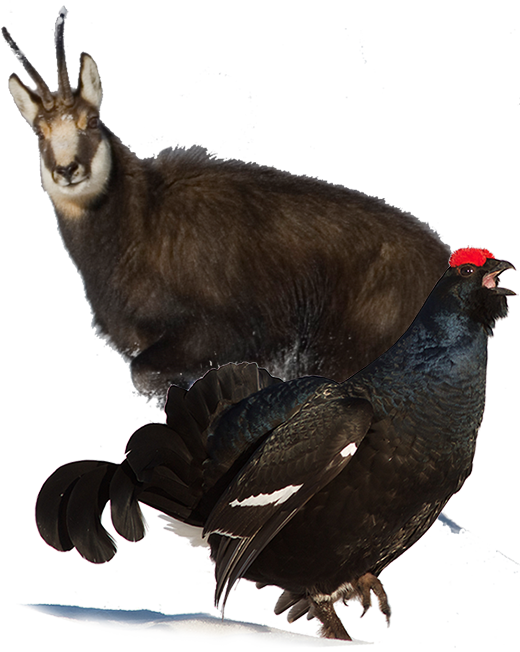They need to maintain their body temperature despite cold weather, wind and snow.
Food is rare, and available food only provides low caloric value. Animals aim at saving precious energy.
They tend to stay in their comfort zones where life is a bit easier: forest edges, windy ridges and other snow free or sun-drenched zones.
They calm down their life functions and move only when it is necessary.
Animals are vulnerable and need
quiet and peace in their living space.
In winter, when you leave your warm home and head out to the snow around your favorite mountain, you enter a vulnerable world. The animals there have to face harsh living conditions.
Some animals have specific survival strategies: They feed on fat reserves, spend most of their time in hideaways to protect themselves from predators or in igloos to stay warm.

When you head out, you might enter the animals’ comfort zone – often suddenly, and without noticing it.
They perceive you as a danger, will be put under stress and will most probably take flight and burn precious energy in order to save their lives.
Stressed and weakened animals are more vulnerable to diseases and to natural predators.
click to know more about a species
By acting responsibly, you help wildlife to survive.
You become part of the mountain.
In winter, animals need their comfort zones. Avoid forest edges, ridges and other snow free areas as well as marked wildlife reserves or wintering habitats.
Consider these zones while choosing and planning your tour.
Stay on marked paths, recommendedroutes and existing tracks, so that animals can get used to human presence, especially in the forest and along forest edges.
Do not track animals.
Avoid disturbance by behaving and speaking quietly. Avoid setting out in early morning or evening hours. When you see or hear animals, stop and wait to let them escape. Observe them from a distance.
If you have a dog, keep it on a leash, or better, leave your best friend at home for your winter activities.
Your impact on wildlife depends on weather and snow conditions, species and period of the year.
Get the necessary information and evaluate your potential impact on vulnerable species.See tools below.
Here is some further information to help you make the right choices while planning, out on tour or riding.
And always remember, in the mountains,
we are only guests.